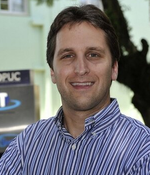Program
09:15-09:30 | Welcome & opening |
09:30-10:30 |
Paper Session 1 |
CodeKōan: A Source Code Pattern Search Engine Extracting Crowd Knowledge |
|
CrowdAssistant: A Virtual Buddy for Crowd worker |
|
10:30-11:00 |
Coffee Break |
11:00-11:30 |
Preparation for Group Discussion |
11:30-12:30 |
Keynote Speak |
What would a science of software engineering look like? |
|
12:30-14:00 |
Lunch Break |
14:00-15:30 |
Paper Session 2 |
Competence, Collaboration and Time Management: Barriers and Recommendations for Crowdworkers |
|
Do Extra Dollars Paid-Off? – An Exploratory Study on TopCoder |
|
A Hybrid Simulation Model for Crowdsourced Software Development |
|
15:30-16:00 |
Tea Break |
16:00-17:00 |
Group Discussions |
Previous Workshops
See our previous editions: CSI-SE 2017 | CSI-SE 2016 | CSI-SE 2015 | CSI-SE 2014
Call for Papers
Workshop Theme
Inspired and evolved from open source development and software outsourcing, Crowdsourcing is playing an increasingly important role in both software engineering practice and research, providing a viable strategy to complete a wide spectrum of software engineering activities in efficient and effective ways. Software practitioners can both contribute and learn from engaging with the processes and knowledge repositories of crowd production, while software engineering researchers are discovering new models, methods, and tools to facilitate more effective and efficient crowd production. Broader community and society are also benefiting from software crowdsourcing in rapid task coordination, parallel peer production, talent identification and utilization.
Crowdsourcing in software engineering centers around the core concept of peer software production, with many principles shared or evolved from open source software development (OSSD) and other forms of community-based development, e.g. community structure and task coordination mechanisms. However, its unique characteristics introduce many new challenges beyond traditional OSSD. For example, due to highly inter-dependent task natures in software development, it is a key challenge to find an appropriate decomposition that can be effectively crowdsourced. As a large number of software tasks are posted online daily, the scenery of crowdsourcing is changing continuously; without appropriate decision support, online developers often make decisions in ad hoc manners. Managers are also skeptical and concerned about the limited trust and control over unknown crowd workers.
CSI-SE will inform the software engineering community of current techniques and trends in crowdsourcing, discuss the applications of crowdsourcing to software engineering already occurring in practice, and examine new opportunities and challenges to innovate and scale crowdsourcing in solving software engineering problems.
Topics of Interest
- Techniques for performing software engineering activities using micro-tasks
- Techniques that integrate crowd knowledge into automated software engineering techniques
- Techniques and systems that enable non-programmers to contribute to software projects
- Techniques for publicly sharing and collaborating with snippets of code
- Techniques for motivating contributions and ensuring quality in systems allowing open contribution
- Systems that collect and publish information on reputation
- Empirical studies on use of crowdsourcing in software engineering
- Crowd funding software development
- Programming competitions and gamification of software development
- Open communities and systems for sharing knowledge such as Q&A sites
- Web-based development environments
Keynote

Dr. James D. Herbsleb
Carnegie Mellon University
Title: What would a science of software engineering look like?
Abstract: In software engineering research, human characteristics have traditionally been treated as peripheral. We have also seen, over the 50 years or so that software engineering has existed as a field of research, nearly continuous hand-wringing about our unsatisfyingly small impact on practice. In this talk, I argue that these two traits are closely-related and stem from the same source, which is treating the way humans think, act, and coordinate as outside the core concerns of our discipline. We need a fundamental shift in our culture, training, time horizon, and research focus in order to set the field on a path of long-term progress.
Biograph: James Herbsleb is a Professor in the Institute for Software Research in the School of Computer Science at Carnegie Mellon University, where he serves as Director of the PhD program in Societal Computing. His research interests lie primarily in the intersection of software engineering, computer-supported cooperative work, and socio-technical systems, focusing on such areas as geographically distributed development teams and large-scale open source development. He holds a PhD in psychology, and an MS in computer science. His research has won several awards, including the ACM Outstanding Research Award (2016), Alan Newell Award for Research Excellence (2014), Most Influential Paper award (ICSE 2010), Honorable Mention for Most Influential Paper award (ICSE 2011), ACM Distinguished Paper Award (ICSE 2011), Best Paper Award (Academy of Management, 2010), ACM Distinguished Paper Award (ESEM 2008), and Best Paper Award (CSCW 2006). For about two decades, he has worked with many extraordinary colleagues to try to understand the complex and dynamic relationship between human collaboration and the software that the humans are designing and using. On his optimistic days, he feels he has made a bit of progress.
Workshop Organizers

Ye Yang
Stevens Institute of Technology
Co-Chair

Rafael Prikladnicki
PUCRS University
Co-Chair
Program Committee
- Raian Ali, Bournemouth University, UK
- Alessandro Bozzon, Delft University of Technology
- Zhenyu Chen, Nanjing University, China
- Schahram Dustdar, TU Wien
- Anand Kulkarni, Stealth Mode Startup Company
- Ke Mao, Facebook, USA
- Fabrizio Pastore, University of Milano – Bicocca, Italy
- Razieh Saremi, Stevens Institute of Technology, USA
- Anita Sarma, Oregon State University, USA
- Daniel Schlagwein, University of New South Wales, Australia
- Patrick Wagstrom, Capital One, USA
- Junjie Wang, ISCAS, China
- Wenjun Wu, Beihang University, China
Steering Committee
- Gordon Fraser, University of Sheffield
- Klaas-Jan Stol, Lero and University College Cork
- Leonardo Mariani, University of Milan Bicocca
- Thomas LaToza, George Mason University
- Ke Mao, Facebook
Submission Guidelines
Full papers
Max. 8 pages. Describing in-depth studies, experience reports, or tools for crowdsourcing and/or open collaboration with evaluation.
Short papers
Max. 4 pages. Describing early ideas with appropriate justification, preliminary tool support, or short studies highlighting interesting findings.
Research notes
Max. 2 pages. This type of submissions is to encourage novel and visionary contributions that have not been developed in-depth.
Each paper will be reviewed by three members of the program committee. Accepted papers will appear in the ICSE Companion Volume proceedings and be presented at the workshop.
Format and Submission Site
Papers and abstract should conform to the ICSE submission format and guidelines. Please submit the papers in PDF format on EasyChair. Papers submissions should be original and unpublished material describing innovative and mature research results, experience reports, case studies, challenges, problems and solutions, ongoing work, new ideas, new results and future trends. The accepted workshop papers, both full and short, and two page position papers will be published in the ICSE 2018 workshop proceedings in the ACM Digital Library. Authors of accepted papers and talks are required to register and present the paper at the workshop for the paper and or extended abstract to be included in the proceedings. The official publication date of the workshop proceedings is the date the proceedings are made available in the ACM Digital Library. This date may be up to two weeks prior to the first day of ICSE 2018. The official publication date affects the deadline for any patent filings related to published work.
SubmitAccepted Papers:
- CodeK_an: A Source Code Pattern Search Engine Extracting Crowd Knowledge:Christof Schramm, Wingding Wang, and Fran his Bry.
- CrowdAssistant: A Virtual Buddy for Crowd worker: Kumar Abhinav, Alpana Dubey, Sakshi Jain, Gurpriya Bhatia, Blake McCartin, and Nitish Bhardwaj
- A Hybrid Simulation Model for Crowdsourced Software Development: Razieh Saremi
- Do Extra Dollars Paid-Off? An Exploratory Study on TopCoder: Lili Wang and Yong Wang
- Competence, Collaboration and Time Management: Barriers and Recommendations for Crowdworkers: Alexandre Lazaretti Zanatta, Leticia Machado, and Igor Steinmacher